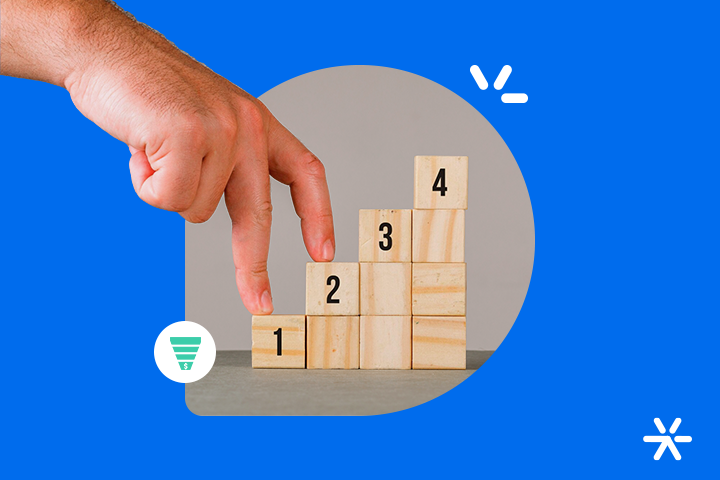Is It Better to Hire a Marketing Agency or Build an In-House Marketing Team?
When a company starts to grow and has clear goals to scale operations and boost business, the creation of specialized teams in each operational area becomes inevitable.
One of these teams is marketing, responsible for brand positioning and promotion, lead generation and qualification for sales, and all necessary support to boost sales results.
If you’re at the stage of structuring your marketing operation but don’t know where to start, you’ve come to the right article.
Here, we’ll cover the main areas and roles, as well as different marketing team models that can meet the needs of companies of all sizes.
What Are the Main Marketing Areas and Roles?

The marketing department has many divisions and specialties that professionals can pursue.
Not all marketing teams include this entire list of specialized professionals, but we’ll mention all of them so you can understand each in detail.
Leadership
A strong marketing team requires a strong leader—someone who can guide and inspire the team, develop talent, and has technical knowledge to monitor investments and actions.
Depending on the company’s size, this professional could be a supervisor, coordinator, marketing manager, or CMO (Chief Marketing Officer).
In larger teams, it’s common to have a leader for each specific area.
Operations
The operations role in a marketing team may be filled by a generalist professional who oversees and directs the execution of tasks, whether done internally or via external providers such as freelancers or agencies.
This professional is expected to have at least basic knowledge of all areas and be able to develop, execute, and monitor strategies.
Job titles may include marketing analyst, digital marketing analyst, or e-commerce analyst, depending on the business profile.
Paid Media
Paid media involves advertisements to promote a brand via platforms like Facebook, Instagram, Google, YouTube, Twitter, LinkedIn, and others.
It also includes offline paid media like radio, TV, magazines, newspapers, and outdoor ads.
Online and offline paid media analysts typically have different expertise.
You might also be interested in — Turn Your Paid Traffic into a Lead-Generating Machine.
Content
Nearly all marketing strategies and campaigns require content development: social media posts, blog articles, emails, scripts—all rely on content analysts, copywriters, or writers to be effectively developed.
These professionals are responsible for crafting articles with the right tone and persuasive arguments.
Social Media
Today, most companies—even B2B ones—recognize the need for a social media presence.
The social media analyst ensures proper positioning and relevant content for the audience, managing platforms like Facebook, Instagram, YouTube, LinkedIn, Twitter, TikTok, etc.
Design
Visual elements are just as important as text. Design spans ad creatives, websites, landing pages, print materials, videos, and even product packaging and app visuals.
Design roles include graphic designer, layout designer, UI/UX designer, web designer, videomaker, video editor, and more.
SEO
SEO (Search Engine Optimization) focuses on optimizing content for search engines. The SEO analyst works to improve website rankings and drive organic traffic through strategic keyword use, structure, and content quality.
CRO
CRO (Conversion Rate Optimization) aims to improve conversion rates. Professionals in this area, such as growth hackers or CRO analysts, analyze data, conduct research, and test hypotheses to increase sales and performance using existing resources.

Trade Marketing
Trade marketing deals with promotion and sales strategies at the point of sale, including events, fairs, and physical stores.
Professionals in this segment include event analysts, trade marketing analysts, offline marketing analysts, and point-of-sale (POS) marketing analysts.
Internal Marketing
Also known as internal communication or endomarketing, this area communicates brand strategies internally. Motivated teams that feel part of the business are more results-focused.
Roles include internal communication analyst or endomarketing analyst.
Data Analysis
Data analysis is crucial for planning and monitoring marketing actions. Data or Business Intelligence analysts transform numbers into actionable strategies.
4 Marketing Team Models

These models, along with the professionals hired, directly impact brand results.
Startups won’t typically hire full teams right away. Fortunately, various formats exist for building a capable team.
Models depend on factors like company size and available marketing budget.
Based on Operational Areas
This collaborative model involves specialists in each area handling all tasks within their field as needed. It features a flat hierarchy and sector integration.
Based on Accounts
Common in agencies, this model forms multidisciplinary teams for each client account.
Based on Products
Ideal for companies with multiple brands under one umbrella or distinct B2B and B2C divisions. Similar to the account-based model but internal.
Based on Projects
For launches, events, or campaigns, temporary or outsourced teams may be assembled for added focus during peak workloads.
Unsure Whether to Hire an Agency or In-House Team? Here’s When Each Makes Sense

Hiring an in-house team isn’t always the best option. In some cases, hiring specialized providers may be more effective.
What to Consider When Building a Marketing Team
Several factors influence this decision:
- Company size
- Business challenges
- Work volume and required expertise
- Available marketing budget
Pros and Cons of Hiring an In-House Marketing Team
By having an internal marketing team, you can be sure that all the professionals’ time and energy will be focused on your company.
It’s also easier to set priorities and determine what’s urgent, in addition to having better control over deadlines.
The creation and approval processes also tend to be faster, as there aren’t so many intermediaries involved.
On the other hand, your company will need to recruit and hire the professionals who will make up the team.
If you don’t have expertise in the area, it can be difficult to find the best talent for your team.
You also have to consider that if a professional resigns, the brand may be left unsupported until a replacement is found and trained.
How to hire the best marketing agency for your business?
Searching for agencies that specialize in your specific challenges and in the actions you want to execute is a good starting point.
Seeking referrals and recommendations is also essential to avoid frustration with your choice.
Pros and cons of hiring an agency
When you hire a specialized agency to carry out your brand’s marketing activities, you benefit from agility, since the processes and professionals are already in place to support you.
Due to the expertise they offer in different areas, an agency can be the best option for companies that are just starting to invest in marketing—especially because of the learning opportunities and networking this choice brings.
Hiring an agency also tends to be significantly more cost-effective than hiring multiple professionals for an in-house marketing team.
On the flip side, the same agency team typically handles several accounts, meaning their time, energy, and creativity are split among them.
This can be especially detrimental if your brand has high demand.
Did this article help you?
It’s important to understand that today it’s been getting easier and easier to automate many proccesses that agencies were the sole responsible since forever.
There’s a lot that can be done with AI. And even more in your sales proccess if you use Leadster’s chatbot to generate qualified leads.
Click on the banner below for a free trial today!








